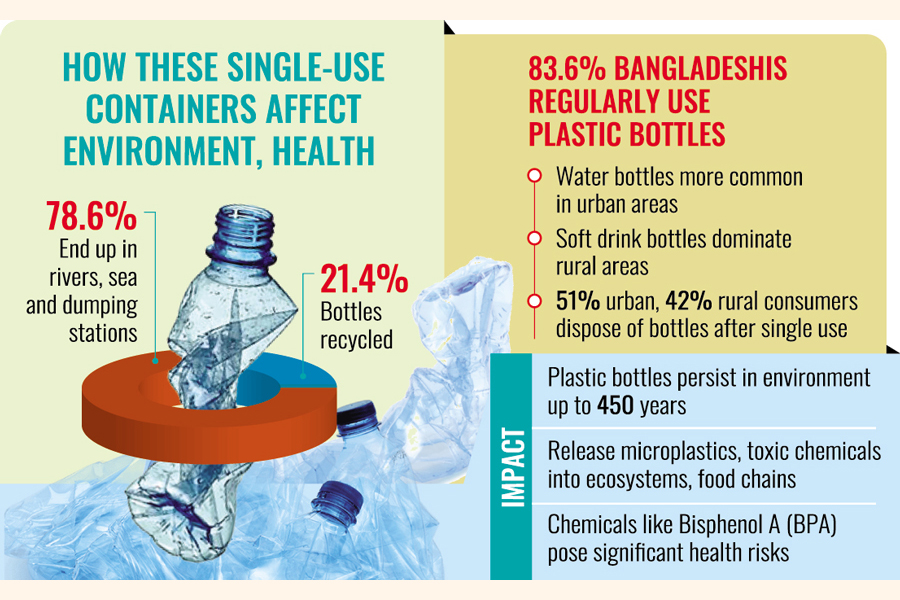
Published :
Updated :

The country uses maximum 3.84 billion of single-use plastic bottles annually -- of which only 21.4 per cent could be recycled.
The remaining 78.6 per cent end up in rivers, sea and dumping stations, increasing health and environmental risks alarmingly, a study reveals.
The Environment and Social Development Organisation (ESDO) has published the report titled "Environmental Impact of Single-Use Plastic Bottles: Pollution and Health Risks" at its office on Tuesday.
The report focused on the severe environmental and health risks associated with single-use plastic bottles in Bangladesh.
It said these bottles persist in the environment for up to 450 years, releasing microplastics and toxic chemicals into ecosystems and food chains.
The study reveals that approximately 3.15 to 3.84 billion single-use plastic bottles are used annually in Bangladesh, while 83.6 per cent of Bangladeshis regularly use such bottles.
It said water bottles are more common in urban areas, while soft drink bottles dominate in rural regions.
Only 18.4 per cent of urban consumers and 5.5 per cent of rural consumers are aware of the health risks posed by the plastic bottles.
Approximately 51 per cent of urban consumers and 42 per cent of rural consumers dispose of plastic bottles after a single use.
Only 3.4 per cent of waste collectors are aware of the environmental consequences of the plastic bottles.
Chemicals like Bisphenol A (BPA), commonly found in these bottles, pose significant health risks, including hormonal disruption and long-term diseases such as cancer.
Syed Margub Morshed, chairperson of the ESDO, said, "Plastic pollution, especially from single-use plastic bottles, poses a significant threat to both our environment and public health. Collective action is crucial to reduce waste, improve recycling systems and protect our ecosystem."
Professor Dr Md Abul Hashem, senior technical adviser to the ESDO, said, "The risks associated with chemicals like BPA and microplastics cannot be ignored as they infiltrate our food chain and harm biodiversity."
Dr Shahriar Hossain, secretary general of the ESDO, said, "Bangladesh's waste management infrastructure is overwhelmed by the sheer volume of plastic waste.
Collaboration among policymakers, businesses, and citizens is essential to drive a sustainable change."
Siddika Sultana, executive director of the ESDO, said, "Awareness is a key tool for combating the single-use bottle crisis. We urge action at every level to support environmentally-friendly solutions, empower waste collectors and implement stricter policies."
The ESDO in its report has recommended for promoting environmentally-friendly and sustainable alternatives, encourage the use of reusable bottles, reduce the production and consumption of single-use plastic bottles, develop and enforce comprehensive policies and regulatory guidelines, support the manufacture of alternative solutions, ensure environmentally responsible recycling practices and impose a ban on the reuse of harmful chemicals and prevent the trade of hazardous plastic waste.
Meanwhile, the fifth session of the Intergovernmental Negotiating Committee to develop an international legally binding instrument on plastic pollution held in between November and December in Busan, Korea.
The negotiations in Busan were supposed to be the final round to produce the first legally binding treaty on plastics pollution, including in the oceans, but negotiators agreed to resume the talks next year.
tonmoy.wardad@gmail.com


 For all latest news, follow The Financial Express Google News channel.
For all latest news, follow The Financial Express Google News channel.